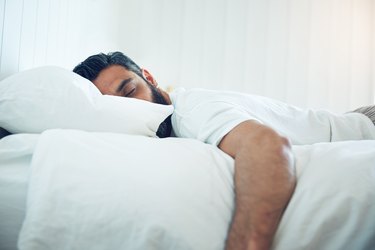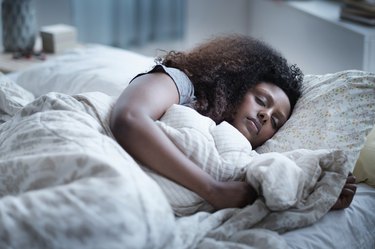
Want a strong immune system? Well, listen up: Sleep is one of the best ways you can improve your body's defenses against disease.
But odds are you're skimping on your shut-eye. More than a third of Americans don't get sufficient sleep on a daily basis, according to the Centers for Disease Control and Prevention. (That's at least seven hours per night, for the record.)
Video of the Day
Video of the Day
Though sleep isn't a cure-all for illness, getting your regular forty winks is one good way to give your body a fighting chance against foreign invaders. Read on to hear what experts and science have to say about the link between sleep and your immune system.
Get tips on how to stay healthy, safe and sane during the novel coronavirus pandemic.
1. Sleep Improves Your Immune System’s Response Time
A good night's slumber keeps your immune system in tip-top shape, so it's ready to react to pathogens. That's in large part because sleep fosters production of your body's fighter T cells, white blood cells that play a critical role in the immune system's response to viruses, according to sleep specialist Michael Breus, PhD, author of The Power of When.
In fact, quality zzzs may even improve T cell functioning. A February 2019 study published in the Journal of Experimental Medicine found that sufficient shut-eye has the potential to boost the effectiveness of T cell responses. The researchers theorize this happens because stress hormones — which may inhibit T cells' ability to kill pathogens — dip during sleep.
A satisfying snooze also promotes the production of other proteins that play a prominent part in your body's immune response.
"By completing the four sleep cycles, you're supporting the release and creation of cytokine, a multifaceted protein that helps the immune system quickly respond to antigens," Breus says.
Related Reading
2. Sleep Informs Your Immunological Memory
How well you snooze can affect your immunological memory, aka your immune system's ability to recognize an antigen that it's already encountered and generate an appropriate immune response.
Case in point: After a routine vaccination, a sound night's sleep can increase your body's antibodies by twofold, thus strengthening your natural immune response against an invading bug, according to a January 2012 article in the Pflügers Archiv European Journal of Physiology.
Conversely, poor sleep may be linked to a lower post-vaccination antibody response, which could make you more vulnerable to disease, per an August 2012 study in Sleep.

3. Lack of Sleep Makes You More Susceptible to Sickness
Not only does scant sleep render vaccines less effective, it also puts you at a higher risk for illness in general.
"Sleep deficiency weakens the barriers and cellular functions that make up immunity, and as a result, those barriers become leaky and your response to infection is slower," Michael Twery, PhD, director of the National Center on Sleep Disorders Research, tells LIVESTRONG.com.
Indeed, a January 2017 study published in Sleep concluded that chronic sleep loss suppresses the immune system. Translation: You're more likely to get sick when you're sleep-deprived.
That's exactly what another September 2015 study in Sleep found: Investigators discovered that people who got insufficient shut-eye were more vulnerable to catching the common cold.
Related Reading
4. Chronic Sleep Deficiency Affects Your Long-Term Health
Unfortunately, the immune-suppressing side effects of bad sleep aren't just short-term problems. Over time, those sleepless nights may amount to more serious setbacks for your overall health.
"There is mounting evidence indicating that irregular sleep schedules across a person's lifespan influence cardiovascular disease risk factors such as nutrition, metabolism and inflammation," Twery says.
In addition to heart-related health issues, chronic sleep deficiency also increases your odds of obesity and diabetes, per the Mayo Clinic.
Perhaps that's because prolonged sleep loss — and the accompanying stress response — triggers chronic low-grade inflammation, as noted in the previously mentioned article in the Pflügers Archiv European Journal of Physiology.
And inflammatory activity is known to cause and advance many common diseases, according to a November 2012 paper published in EMBO Reports.
Tips for Better Sleep
Ready to reap the immune-bolstering benefits of sleep? Here, Twery shares some suggestions to help you sleep like a baby when your head hits the pillow:
- Maintain a regular sleep schedule each day, including on the weekends. Don't skimp on sleep Monday through Friday, then try to make up for it over the weekend.
- Minimize excess light and noise in the bedroom. Consider installing blackout curtains, putting in earplugs, using a white-noise machine and turning off tech devices that emit light.
- Limit alcohol, caffeine, nicotine and other stimulants that might be interfering with your ability to initiate or maintain sleep through the night.
Concerned About COVID-19?
Read more stories to help you navigate the novel coronavirus pandemic:
- Centers for Disease Control and Prevention: “1 in 3 adults don’t get enough sleep: A good night’s sleep is critical for good health.”
- Journal of Experimental Medicine: “Gαs-coupled receptor signaling and sleep regulate integrin activation of human antigen-specific T cells.”
- Pflügers Archiv European Journal of Physiology: “Sleep and immune function.”
- Sleep: “Sleep and antibody response to hepatitis B vaccination.”
- Sleep: “Behaviorally Assessed Sleep and Susceptibility to the Common Cold.”
- Sleep: “Transcriptional Signatures of Sleep Duration Discordance in Monozygotic Twins.”
- Mayo Clinic: “Lack of sleep: Can it make you sick?”
- EMBO Reports: "The inflammation theory of disease."
Is this an emergency? If you are experiencing serious medical symptoms, please see the National Library of Medicine’s list of signs you need emergency medical attention or call 911.